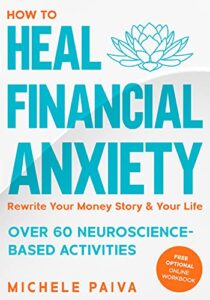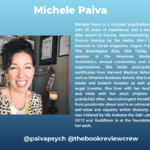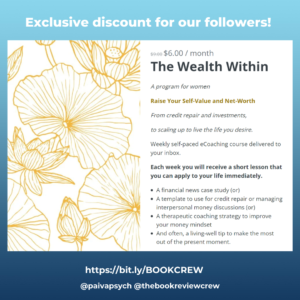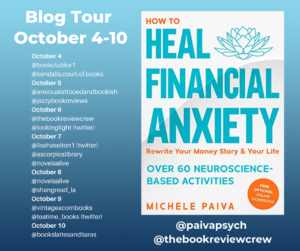 Today’s special guest author is Michele Paiva and she’s chatting with me about her new financial self-help book, How to Heal Financial Anxiety: Rewrite Your Money Story & Your Life.
Today’s special guest author is Michele Paiva and she’s chatting with me about her new financial self-help book, How to Heal Financial Anxiety: Rewrite Your Money Story & Your Life.
See below to enter for a chance to win a $50 gift card, How to Heal Financial Anxiety (in paper or Kindle format), and a free session with Michele to discuss anything from stress to rewriting your money story.
Welcome, Michele. Please tell us a little bit about yourself.
I’m Michele Paiva, a licensed therapist that has a focus in trauma therapy and finance therapy, specializing in women and marginalized populations. I have 30 years of experience and while there’s something to be said for skills and professional experience, I am also a trauma survivor and I also know what it is to be “broke” and feel broken. My father’s family was wealthy, my mother was brought up in an orphanage, so money stories were thick and conflicting growing up.
Please tell us a little bit about your new release.
Money is the number one conflict in a relationship even if it isn’t an outright “fight” and if the number two cause of divorce or breakup. Money and our self-value are so strongly connected and often, in a way that is quite dysfunctional. This book is really taking someone through what might be three years of therapy or more, at their own pace and going as deep as they wish or as lightly as they need to tread. I realize that not everyone can afford therapy so this was a way to, during a pandemic, give back in a small way and hopefully help people from past money stories and also, cope with the pandemic economy.
What inspire you to write this book?
I was inspired when I realized that most of my clients during the pandemic were either overspending or hoarding, and the connection of our trauma and our childhood was seeping in as another layer on top of the pandemic. If the pandemic dissolves tomorrow, the book is still relevant as I don’t touch on the current situation much, but childhood moreso. That’s where all the baseline perceptions are formed.
Excerpt from How to Heal Financial Anxiety:
Forgiving
Forgiving is so needed in fiscal stories and anxiety that there’s even a fiscal term, “forgiving a debt” meaning there is relief from the debt.
We need to forgive ourselves and others. We can’t heal our money story while we are embittered with feelings towards others or ourselves. This comes in the form of forgiving. It’s not enough to say “ I’m sick of feeling anxious and broke”. It’s a start, don’t get me wrong! I’ve taken you through quite a few exercises thus far in this book to help you get your head in the game and your money in a space of security. I don’t want you to lose that momentum once you put it into action. There are a lot of people who are online who boast how they are out of debt. These people will probably go back in debt, statistically speaking, if they don’t also heal the reason they became overwhelmed with debt, to begin with.
Think of it this way, there are millions of people every day they lose a substantial amount of weight and then gain it back.
What you don’t see are people holding signs saying “Gained back the 75 pounds” or “No longer free from debt, I messed up!”.
You see the highlight reels of people’s lives online, so focusing on that aspect is going to be part of that comparing habit I want you to ignore, push aside and deal with when you are ready.
If you’ve been struggling thus far with this book, you may need to start here and then go back to square one.
If you are someone who has been having success so far, or feeling lots of “aha” moments and moving forward, this will help you to stay on track.
Forgiving does not mean we forget the problem that led us here or the people, situations or mistakes made that we have been holding onto subconsciously or consciously.
It means we give up the need to feel resentment and grant relief to ourselves.
Resentment and bitterness take up a lot of space within us, so when we have more space, we have more space to fill it with behaviors and feelings that serve us.
There is an energy between you and money. Between you and money is “magic” or “energy” or “intention” or “anger” etc., whatever you want to call it.. but it’s not working for you but against you. The money doesn’t care where it lands so the only variable here is you.
What exciting project are you working on next?
I’m working on a book about how it feels to heal a broken heart if you are with or were with, a narcissist. Narcissist abuse is the root of most trauma, from an uncaring parent to an emotionally disconnected partner, the pain is real and can be very damaging. Many people do not realize that we all have narcissism as a human experience and it gets ugly when we are less resilient. Men tend to have fewer communication skills in relationships by the experiences of my private practice so they may seem more narcissistic; this book will be for women to manage those relationships and then if need be, how to extract in a way that is less painful.
 When did you consider first consider yourself a writer?
When did you consider first consider yourself a writer?
I was a journalist in my earliest years, so I was a writer by trade in my early twenties. I used writing as a stepping stone and once I reached where I thought my highlight reel was shining brightest, I realized that nothing compared to writing. I’ve done quite a bit of neuromarketing work for others which involved marketing-focused writing and a few articles, but overall, I wanted to write to satisfy something inside of me that nothing else could ever touch – so writing How to Heal Financial Anxiety was a labor of self-care as much as an olive branch of outreach. I should mention, I don’t think I’m a great writer. I wish I were better, and work on it. My content and what I want to share, is deeply meaningful to me, to help others. I would consider myself more of a though-doodler than a writer!
 Do you write full-time? If so, what’s your work day like? If not, what do you do other than write and how do you find time to write?
Do you write full-time? If so, what’s your work day like? If not, what do you do other than write and how do you find time to write?
I would say that writing is about 30% of my professional life and I really enjoy it. My day begins with a Yorkie rescue jumping on me to wake up, then I shuffle to get coffee while he takes his time relaxing his little intestines outside. After breakfast, I answer emails, plan my dinner, and work out. Then I write for about two hours, for myself or clients, and then begin creating video content and in the afternoon, see clients. After that, it’s dinner, and rerun sitcoms if I’m not working on a specific project. I try to get a workout in the evening as well. This sounds like a lot of fitness; it’s more rehabilitation because I was in a car accident in 2018. I was at a stop, in traffic, and the driver behind me didn’t have her eyes on the road and hit me. I’m still in physical therapy and my life before the accident was me teaching yoga as well but that has stopped… so I’m working out to rain strength, and hopefully yoga will not be a thing of the past.
What would you say is your interesting writing quirk?
My interesting writing quirk is that I think the entire book out in my mind then sit down and write it in a marathon of sorts. I’m neurodivergent; with autism, dyslexia, and central auditory processing disorder, so I’m not sure if those promote or sabotage the ease of writing as I do not know any different, but I can tell that I do things a little differently than neurotypical friends. My other quick is that I can’t be in casual clothes, I have to be dressed as if I am seeing clients, regardless of the hour I am writing. I also use Young Livings “Envision” oil at my desk and wrists. I feel it helps me focus!
As a child, what did you want to be when you grew up?
As a child, I wanted to be a magical genie and I think writing is the next best thing, with very similar results!
Anything additional you want to share with the readers?
I want anyone who is suffering or holding onto shame to know that you are not alone. If your suffering is from your past or relationship or your shame is from feeling like you are not enough fiscally, you are not isolated. These are common struggles and while that doesn’t take the struggle away, I hope it gives you some comfort. I want you to know that you deserve respect, to heal, to feel free to speak your truth (hell, to even know what your truth is) and to be loved for who you are not what you give someone.
Anxiety is not a way of life nor should it define you; it is a response to something that isn’t right in your past or present and a reaction that it might continue into your future. You are meant to be at peace.
Links:
Website | YouTube | TikTok | Instagram | Twitter | Amazon | Goodreads
Course link: https://bit.ly/BOOKCREW
Enter for a chance to win a $50 gift card, How to Heal Financial Anxiety (in paper or Kindle format), and a free session with Michele to discuss anything from stress to rewriting your money story. How to Heal Financial Anxiety


